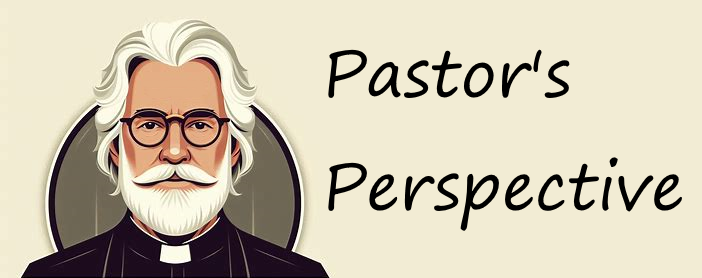Pastor Patrick’s Perspective: July 2025
Various issues prevent people from hearing the good news of Jesus Christ. Some are intellectual issues that block belief. The problem of suffering is one.
The problem of suffering has been expressed in various ways. If God is all powerful, why does suffering exist? The problem goes back to the ancient Greek philosophers and the problem of the existence of evil. While Epicurus is most known for his philosophy of pleasure, he gives the best-known version of this argument. “Is God willing to prevent evil, but not able? Then he is not omnipotent. Is he able, but not willing? Then he is malevolent. Is he both able and willing? Then from where does evil? Is he neither able nor willing? Then why call him God?”
People suffer; there is no doubt about it. Almost everyone in our class knew someone who went through severe pain and suffering. There are cases of untimely death, freak accidents, incurable diseases, medical mistakes, psychological ills, painful ailments, and deterioration of old age. I’m sure that you can add more to this list. My point is not to list all the ways we suffer, but to notice the perversity of pain.
Philosophers create many arguments on why suffering exists. These theories are known as theodicies. One of these theories argues that evil results from human free-agency. Since we are able to make some choices, we will make some bad choices that create pain for someone. Another theory argues that we live in the best possible world, which minimizes pain and suffering while maximizing human flourishing. Often, these theories are presented as God’s big picture. Unfortunately, these theories do not assure people who have experienced the personal effects of evil that God is good. For the sufferer, they do not create trust in the Lord Christ.
Turning to the Bible actually helps. The Bible acknowledges pain and suffering. The Book of Psalms contains many cries to the Lord from people suffering. Consider Psalm 25:16-18.
“Turn to me and be gracious to me,
for I am lonely and afflicted.
The troubles of my heart are enlarged;
bring me out of my distresses.
Consider my affliction and my trouble,
and forgive all my sins.”
Tradition holds that the great David wrote this psalm. Scholars list it as a psalm of lament. A lament moves from crisis to relief, from hurt to joy, from desperation to hope.
The Book of Job is an extended discussion about the problem of suffering. According to the scriptures, Job is a righteous man who loses everything, even his own health. All his friends try to explain Job’s suffering. As readers, we know Satan causes Job’s pain, but Job and his friends do not know that. Instead, they try to convince Job that he must have really sinned, and that God was punishing him for his failures. The book ends with the Lord confronting Job, Job repenting of trying to know the ways of God, and receiving redemption from the Lord.
Jesus was asked a similar question in Luke 13, when Pilate massacred many Galileans and had their blood mixed with the temple sacrifices. Jesus responded, “Do you think that these Galileans were worse sinners than all the other Galileans because they suffered this way?” All suffering can not be attributed to the individual’s sins.
One of the most helpful responses to the problem of pain is found in Martin Luther’s thought. (Imagine that, a Lutheran pastor recommending Luther.) He called it “the theology of the cross.” The framework for this disputation is based upon the first chapter of I Corinthians, which Trinity has been reading for the last couple of weeks. “The message of the cross is foolishness to those who are perishing, but to us who are being saved, it is the power of God.”
The theology of the cross looks to the cross as the ultimate revelation of God’s salvation for humanity. The cross reveals a God who suffers for us in human flesh. When the Son of God became man, he entered a life filled with pain, suffering, and difficulties. These took Jesus to cross where he bore the sins of the world for our sake. We find Jesus in the midst of suffering. Suffering is not something foreign to Jesus.
The theology of the cross does not answer the question of why people suffer, but helps us live in a world full of pain. In his book, Pastoral Care under the Cross, Pastor Eyer wrote, “The cross, like suffering itself, is a mystery. Why God chose to make Himself known in the midst of suffering on a cross, God only knows. Perhaps, if speculation is allowed, it is because it is there that we need Him most. Or perhaps it is there that we least expect to see God, yet God does come—on his own terms, by grace. He cannot be cornered by our logic or theology.”
© Patrick K Welton
